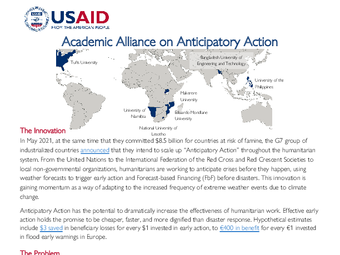The 4As partnership: gathering academic evidence about anticipatory action
Everyone is talking about how anticipatory action can be faster, cheaper and more effective than traditional responses. However, we have very little evidence on what works! What kind of anticipatory actions are beneficial, for whom, and in which situations? Can we, as a humanitarian sector, deliver on the promise of this innovation?
On 8 December 2021, the U.S. Agency for International Development (USAID) launched a new partnership with seven universities to answer these questions. The Academic Alliance for Anticipatory Action (4As) consortium is led by Tufts University in the US, partnering with Makerere University in Uganda, the National University of Lesotho, the University of the Philippines, Bangladesh University of Engineering and Technology, the University of Namibia, and Eduardo Mondlane University in Mozambique.
“What excites me about the 4As is the different open-minded people, from different academic disciplines and experiences, working towards a common goal,” explained Mecthilde Pinto, a researcher at the University of Namibia.
The team is on standby to support the evaluation of any anticipatory actions carried out in the humanitarian sector. When there is an anticipatory intervention, the team will support impact evaluations and data analysis. Pinto adds that “our vision is for academic research on anticipatory actions that translates into long-term implementable actions, plans and outcomes that inform and guide drought-intervention strategies”.
The researchers in the team come from various disciplines, including nutrition, hydrology, sociology and climate science. “Through this consortium, anticipatory action for different disasters can be seen and analysed through a common global lens, said Dr Shampa, assistant professor at the Institute of Water and Flood Management, Bangladesh University of Engineering and Technology. “I hope the 4As will grow and work by blending human knowledge across the globe on different disasters, and solve the existing issues of anticipatory action based on evidence-based actions”. Dr Shampa’s research will focus on socio-economic indicators that best determine impact curves for floods or related disasters.
Next year, 1 in 29 people are projected to need humanitarian assistance to survive — a record high. To meet the vast needs, research like this is critical as the international community looks for innovative, cost-effective ways to save more lives and support the early recovery of vulnerable populations.
The 4As team hosted an interactive debate on research methods at the 9th Global Dialogue Platform on Anticipatory Humanitarian Action this week, and team members conducted a fun ‘myth-busting’ keynote session on Tuesday 7 December. The group looks forward to partnering with people from across this community of practice, and plans to feature all of its findings on the Anticipation Hub.
Meet the collaborators in this short videoFor more information and potential collaboration, please reach out to Erin Coughlan de Perez.


